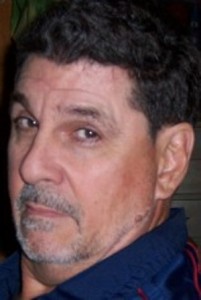And the miners came down from the hills
only once a month, to eat, drink, fight,
if they were lucky,
spend the night with a woman,
instead of in jail.
For sheriff Bennett met them at the edge of town
and gave them the same warning each time:
‘Have a good time, boys, but don’t wreck the town.’
And the miners nodded sincerely,
chorused, ‘Sure, sheriff. You bet. We promise.’
But the sheriff was used to their rough ways
and knew they were there to escape the pressures
that gripped them in the bowels of the earth.
And they weren’t bad men, just childlike,
toiling like slaves of eld, then seeking release.
They meant their promises and meant no harm.
Nevertheless, the sheriff hired extra deputies
on the day the miners came to town
for their monthly binge.
Now the miners respected the sheriff,
who understood their need to blow off steam,
but the deputies were another kind of cop.
Mostly young, scared, acting tough to impress the hard men
who only feared Mother Earth’s crushing embrace
waiting to hold them close, far beneath the surface.
And they mocked the posing deputies
who wore one-way sun glasses to hide the uncertainty
that made the miners mistrust them.
There was one deputy the miners really hated.
Reardon, a big-bellied bully, meaner than the rattlesnakes
that sometimes tumbled down the mineshaft
and couldn’t find their way to the surface again
and shared the dark confines with their fellow prisoners
and sometimes got lucky and bit someone,
before the miners could stomp them to death.
The only thing the miners hated more than rattlers
were the bosses, whose venom flowed from far away.
Reardon always greeted them the same way,
slapping his club in his bulbous paw, scaring no one,
but alert for the chance to hurt the miners.
They despised him, staring through him,
another dangerous clod of earth to be avoided ,
but never feared, because he only trapped the unwary,
and if you labored deep below the ravaged earth
you learned to be wary, or didn’t survive
the hungry pits that always beckoned.
So the miners rushed to their favorite bars,
where bored trailer girls served the drinks
and didn’t really care that a lot of hands
did a lot of exploring of their veined bodies.
And they listened to the usual comments:
“That’s a number one shaft. Deep hole. Dig that strata.”
And the girls snapped their gum in boredom,
for they took worse abuse than words
from the harsh hands of their redneck boyfriends.
The retired professor of something or other
met them at ‘Purple Nell’s’ and bought them drinks,
preached to them that they should spare the earth.
They laughed kindly at him and explained it was their job,
if they didn’t do it, the company would hire others
eager to take their place in the mines, because
someone was always waiting to steal a man’s job.
But they never insulted the professor
while drinking his liquor.
The miners never went to ivy covered schools,
had no book learning, just blue collar skill,
acquired the hard way, in the pits of shattered dreams,
where the mines sapped the souls of men
who never got used to the pressing rock above
and the dank, devouring dark below,
always waiting, implacable as time,
to catch a careless miner in a moment’s lapse,
the last summons to the final ascent.

Gary Beck has spent most of his adult life as a theater director, and as an art dealer when he couldn’t make a living in theater. He has 11 published chapbooks. His poetry collections include: Days of Destruction (Skive Press), Expectations (Rogue Scholars Press). Dawn in Cities, Assault on Nature, Songs of a Clerk, Civilized Ways (Winter Goose Publishing). Perceptions, Displays, Fault Lines and Tremors will be published by Winter Goose Publishing. Conditioned Response will be published by Nazar Look. His novels include: Extreme Change (Cogwheel Press) Acts of Defiance (Artema Press). Flawed Connections (Black Rose Writing). His short story collection, A Glimpse of Youth (Sweatshoppe Publications). His original plays and translations of Moliere, Aristophanes and Sophocles have been produced Off Broadway. His poetry, fiction and essays have appeared in hundreds of literary magazines. He currently lives in New York City. A Miner’s Quest appears in Civillised Ways. Editor’s Note.
editor@artvilla.com
robin@artvilla.com
www.facebook.com/PoetryLifeTimes
www.facebook.com/Artvilla.com